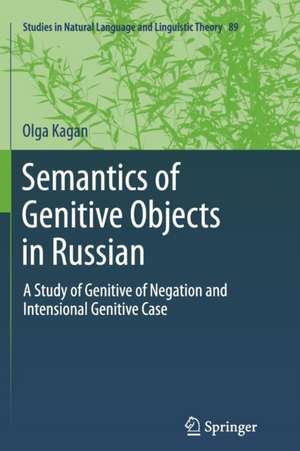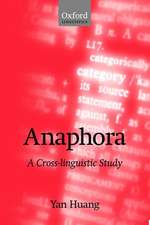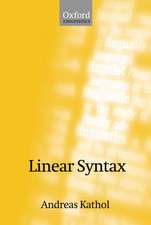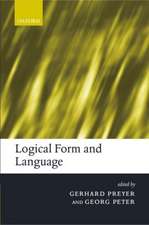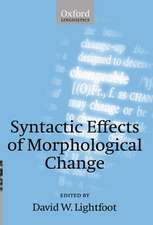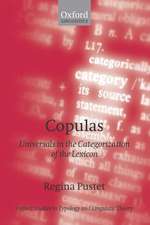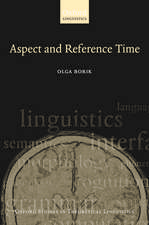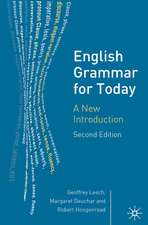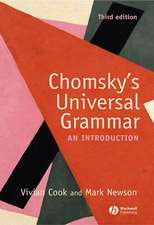Semantics of Genitive Objects in Russian: A Study of Genitive of Negation and Intensional Genitive Case: Studies in Natural Language and Linguistic Theory, cartea 89
Autor Olga Kaganen Limba Engleză Paperback – 9 noi 2014
| Toate formatele și edițiile | Preț | Express |
|---|---|---|
| Paperback (1) | 722.43 lei 6-8 săpt. | |
| SPRINGER NETHERLANDS – 9 noi 2014 | 722.43 lei 6-8 săpt. | |
| Hardback (1) | 728.43 lei 6-8 săpt. | |
| SPRINGER NETHERLANDS – 11 oct 2012 | 728.43 lei 6-8 săpt. |
Din seria Studies in Natural Language and Linguistic Theory
- 24%
 Preț: 808.06 lei
Preț: 808.06 lei - 18%
 Preț: 788.72 lei
Preț: 788.72 lei - 18%
 Preț: 958.56 lei
Preț: 958.56 lei - 15%
 Preț: 600.26 lei
Preț: 600.26 lei - 18%
 Preț: 947.67 lei
Preț: 947.67 lei - 15%
 Preț: 646.62 lei
Preț: 646.62 lei - 18%
 Preț: 723.56 lei
Preț: 723.56 lei - 15%
 Preț: 604.84 lei
Preț: 604.84 lei - 18%
 Preț: 952.09 lei
Preț: 952.09 lei - 15%
 Preț: 642.51 lei
Preț: 642.51 lei - 18%
 Preț: 947.50 lei
Preț: 947.50 lei - 15%
 Preț: 646.75 lei
Preț: 646.75 lei - 18%
 Preț: 1224.54 lei
Preț: 1224.54 lei - 15%
 Preț: 641.71 lei
Preț: 641.71 lei - 18%
 Preț: 2314.56 lei
Preț: 2314.56 lei - 18%
 Preț: 952.89 lei
Preț: 952.89 lei - 18%
 Preț: 1220.12 lei
Preț: 1220.12 lei - 15%
 Preț: 642.83 lei
Preț: 642.83 lei - 18%
 Preț: 944.19 lei
Preț: 944.19 lei - 15%
 Preț: 648.05 lei
Preț: 648.05 lei - 18%
 Preț: 952.57 lei
Preț: 952.57 lei - 18%
 Preț: 1729.61 lei
Preț: 1729.61 lei - 15%
 Preț: 644.95 lei
Preț: 644.95 lei - 15%
 Preț: 644.63 lei
Preț: 644.63 lei -
 Preț: 384.48 lei
Preț: 384.48 lei - 18%
 Preț: 1662.85 lei
Preț: 1662.85 lei - 18%
 Preț: 955.08 lei
Preț: 955.08 lei - 18%
 Preț: 952.40 lei
Preț: 952.40 lei -
 Preț: 386.81 lei
Preț: 386.81 lei
Preț: 722.43 lei
Preț vechi: 881.01 lei
-18% Nou
Puncte Express: 1084
Preț estimativ în valută:
138.25€ • 150.12$ • 116.13£
138.25€ • 150.12$ • 116.13£
Carte tipărită la comandă
Livrare economică 23 aprilie-07 mai
Preluare comenzi: 021 569.72.76
Specificații
ISBN-13: 9789401781954
ISBN-10: 9401781958
Pagini: 204
Ilustrații: XVIII, 186 p.
Dimensiuni: 155 x 235 x 11 mm
Greutate: 0.3 kg
Ediția:2013
Editura: SPRINGER NETHERLANDS
Colecția Springer
Seria Studies in Natural Language and Linguistic Theory
Locul publicării:Dordrecht, Netherlands
ISBN-10: 9401781958
Pagini: 204
Ilustrații: XVIII, 186 p.
Dimensiuni: 155 x 235 x 11 mm
Greutate: 0.3 kg
Ediția:2013
Editura: SPRINGER NETHERLANDS
Colecția Springer
Seria Studies in Natural Language and Linguistic Theory
Locul publicării:Dordrecht, Netherlands
Public țintă
ResearchCuprins
Abbreviations .- Acknowledgements .- Preface . 1. Introducing the Problem: Structural Case Alterations . 2. Outline of the Book . 3. Methodology, Data and Judgments .- Chapter 1. 1.1 Genitive Objects and the Inherent/Structural Distinction .- Chapter 2. 2.1. The Configurational Approach.- Chapter 3. 3.1. Subjunctive Mood: An Introduction .- Chapter 4. 4.1. Non-Semantic Factors . Chapter 5. 5.1. Preview: The Importance of REC .- Chapter 6. 6.1. Irrealis Genitive in Negative Contexts .- Chapter 7. 7.1. Aspect and Number Affect Case-Assignment .- Chapter 8. 8.1. Differential Object Marking .- Conclusion .- Bibliography.
Recenzii
From the reviews:
“Kagan … takes on the goal of unifying the Intensional Genitive and the Genitive of Negation as one phenomenon. … This book will be of primary interest to Russianists, as it provides a well-supported analysis of a much-discussed linguistic puzzle in Russian … . will be of primary interest to those interested in non-canonical genitive use in Russian. … It is well researched, well-argued and makes an important contribution to the topic of genitive objects and to the field of Russian linguistics in general.” (Lauren Ressue, The Linguist List, January, 2013)
“Kagan … takes on the goal of unifying the Intensional Genitive and the Genitive of Negation as one phenomenon. … This book will be of primary interest to Russianists, as it provides a well-supported analysis of a much-discussed linguistic puzzle in Russian … . will be of primary interest to those interested in non-canonical genitive use in Russian. … It is well researched, well-argued and makes an important contribution to the topic of genitive objects and to the field of Russian linguistics in general.” (Lauren Ressue, The Linguist List, January, 2013)
Textul de pe ultima copertă
The genitive/accusative opposition in Slavic languages is a decades-old linguistic conundrum. Shedding new light on this perplexing object-case alternation in Russian, this volume analyzes two variants of genitive objects that alternate with accusative complements—the genitive of negation and the intensional genitive. The author contends that these variants are manifestations of the same phenomenon, and thus require an integrated analysis. Further, that the choice of case is sensitive to factors that fuse semantics and pragmatics, and that the genitive case is assigned to objects denoting properties at the same time as they lack commitment to existence.
Kagan’s subtle analysis accounts for the complex relations between case-marking and other properties, such as definiteness, specificity, number and aspect. It also reveals a correlation between the genitive case and the subjunctive mood, and relates her overarching subject matter to other instances of differential object-marking.
Kagan’s subtle analysis accounts for the complex relations between case-marking and other properties, such as definiteness, specificity, number and aspect. It also reveals a correlation between the genitive case and the subjunctive mood, and relates her overarching subject matter to other instances of differential object-marking.
Caracteristici
Sheds new light on the genitive/accusative opposition phenomenon in Russian, an object case alternation that has long puzzled linguists Provides a new semantic analysis of genitive objects Reveals a semantic parallel between genitive Case and subjunctive mood Relates genitive objects in Russian to other instances of differential object marking Explains the relation between case and specificity, definiteness, scope, number and aspect ?
